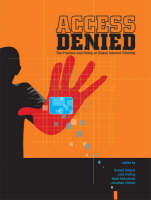
Access Denied
The Practice and Policy of Global Internet Filtering
Seiten
2007
MIT Press (Verlag)
978-0-262-04245-1 (ISBN)
MIT Press (Verlag)
978-0-262-04245-1 (ISBN)
- Titel ist leider vergriffen;
keine Neuauflage - Artikel merken
Many countries around the world block or filter Internet content, denying access to information that they deem too sensitive for ordinary citizens. This work documents and analyzes Internet filtering practices in more than three dozen countries.
This work includes a study of Internet blocking and filtering around the world: analyses by leading researchers and survey results that document filtering practices in dozens of countries.Many countries around the world block or filter Internet content, denying access to information that they deem too sensitive for ordinary citizens - most often about politics, but sometimes relating to sexuality, culture, or religion. "Access Denied" documents and analyzes Internet filtering practices in more than three dozen countries, offering the first rigorously conducted study of an accelerating trend.Internet filtering takes place in more than three dozen states worldwide, including many countries in Asia, the Middle East, and North Africa. Related Internet content-control mechanisms are also in place in Canada, the United States and a cluster of countries in Europe.
Drawing on a just-completed survey of global Internet filtering undertaken by the OpenNet Initiative (a collaboration of the Berkman Center for Internet and Society at Harvard Law School, the Citizen Lab at the University of Toronto, the Oxford Internet Institute at Oxford University, and the University of Cambridge) and relying on work by regional experts and an extensive network of researchers, "Access Denied" examines the political, legal, social, and cultural contexts of Internet filtering in these states from a variety of perspectives.Chapters discuss the mechanisms and politics of Internet filtering, the strengths and limitations of the technology that powers it, the relevance of international law, ethical considerations for corporations that supply states with the tools for blocking and filtering, and the implications of Internet filtering for activist communities that increasingly rely on Internet technologies for communicating their missions.Reports on Internet content regulation in forty different countries follow, with each two-page country profile outline the types of content blocked by category and documenting key findings.
This work includes a study of Internet blocking and filtering around the world: analyses by leading researchers and survey results that document filtering practices in dozens of countries.Many countries around the world block or filter Internet content, denying access to information that they deem too sensitive for ordinary citizens - most often about politics, but sometimes relating to sexuality, culture, or religion. "Access Denied" documents and analyzes Internet filtering practices in more than three dozen countries, offering the first rigorously conducted study of an accelerating trend.Internet filtering takes place in more than three dozen states worldwide, including many countries in Asia, the Middle East, and North Africa. Related Internet content-control mechanisms are also in place in Canada, the United States and a cluster of countries in Europe.
Drawing on a just-completed survey of global Internet filtering undertaken by the OpenNet Initiative (a collaboration of the Berkman Center for Internet and Society at Harvard Law School, the Citizen Lab at the University of Toronto, the Oxford Internet Institute at Oxford University, and the University of Cambridge) and relying on work by regional experts and an extensive network of researchers, "Access Denied" examines the political, legal, social, and cultural contexts of Internet filtering in these states from a variety of perspectives.Chapters discuss the mechanisms and politics of Internet filtering, the strengths and limitations of the technology that powers it, the relevance of international law, ethical considerations for corporations that supply states with the tools for blocking and filtering, and the implications of Internet filtering for activist communities that increasingly rely on Internet technologies for communicating their missions.Reports on Internet content regulation in forty different countries follow, with each two-page country profile outline the types of content blocked by category and documenting key findings.
Ronald Deibert is Associate Professor of Political Science and Director of the Citizen Lab at Munk Centre for Internet Studies, the University of Toronto. John Palfrey is Executive Director of the Berkman Center for Internet and Society and Clinical Professor of Law at Harvard Law School. Rafal Rohozinski is a Research Fellow of the Cambridge Security Program and Director of the Advanced Network Research Group at Cambridge University. Jonathan Zittrain is Professor of Internet Governance and Regulation at Oxford University and Jack N. and Lillian R. Berkman Visiting Professor for Entrepreneurial Legal Studies at Harvard Law School.
| Erscheint lt. Verlag | 20.3.2008 |
|---|---|
| Reihe/Serie | Information Revolution and Global Politics |
| Zusatzinfo | 17 |
| Verlagsort | Cambridge, Mass. |
| Sprache | englisch |
| Maße | 152 x 229 mm |
| Gewicht | 908 g |
| Themenwelt | Informatik ► Theorie / Studium ► Kryptologie |
| Mathematik / Informatik ► Informatik ► Web / Internet | |
| ISBN-10 | 0-262-04245-2 / 0262042452 |
| ISBN-13 | 978-0-262-04245-1 / 9780262042451 |
| Zustand | Neuware |
| Haben Sie eine Frage zum Produkt? |
Mehr entdecken
aus dem Bereich
aus dem Bereich
Geschichte, Techniken, Anwendungen
Buch | Softcover (2022)
C.H.Beck (Verlag)
CHF 13,90
Die faszinierende Geschichte der Verschlüsselung
Buch | Softcover (2022)
Springer (Verlag)
CHF 48,95


